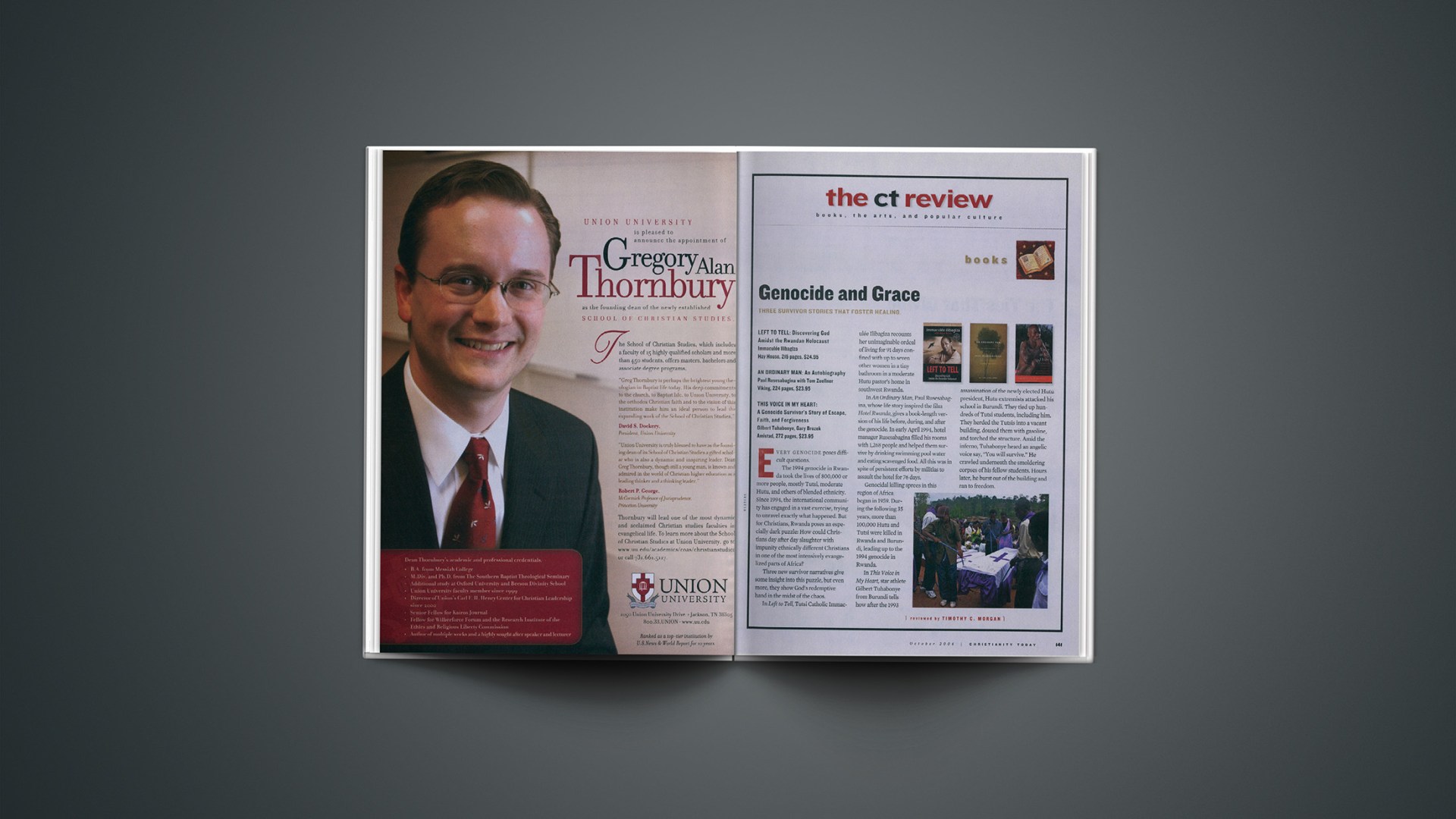Every genocide poses difficult questions.
The 1994 genocide in Rwanda took the lives of 800,000 or more people, mostly Tutsi, moderate Hutu, and others of blended ethnicity. Since 1994, the international community has engaged in a vast exercise, trying to unravel exactly what happened. But for Christians, Rwanda poses an especially dark puzzle: How could Christians day after day slaughter with impunity ethnically different Christians in one of the most intensively evangelized parts of Africa?
Three new survivor narratives give some insight into this puzzle, but even more, they show God’s redemptive hand in the midst of the chaos.
In Left to Tell, Tutsi Catholic Immaculée Ilibagiza recounts her unimaginable ordeal of living for 91 days confined with up to seven other women in a tiny bathroom in a moderate Hutu pastor’s home in southwest Rwanda.
In An Ordinary Man, Paul Rusesabagina, whose life story inspired the film Hotel Rwanda, gives a book-length version of his life before, during, and after the genocide. In early April 1994, hotel manager Rusesabagina filled his rooms with 1,268 people and helped them survive by drinking swimming pool water and eating scavenged food. All this was in spite of persistent efforts by militias to assault the hotel for 76 days.
Genocidal killing sprees in this region of Africa began in 1959. During the following 35 years, more than 100,000 Hutu and Tutsi were killed in Rwanda and Burundi, leading up to the 1994 genocide in Rwanda.
In This Voice in My Heart, star athlete Gilbert Tuhabonye from Burundi tells how after the 1993 assassination of the newly elected Hutu president, Hutu extremists attacked his school in Burundi. They tied up hundreds of Tutsi students, including him. They herded the Tutsis into a vacant building, doused them with gasoline, and torched the structure. Amid the inferno, Tuhabonye heard an angelic voice say, “You will survive.” He crawled underneath the smoldering corpses of his fellow students. Hours later, he burst out of the building and ran to freedom.
All three authors have a Christian background. Ilibagiza and Tuhabonye give us powerful spiritual narratives of how God helped them survive and recover. Rusesabagina reveals that he used both Christ-like empathy and a hotel manager’s acumen to persuade killers to put down their bloodstained machetes. “Words are the most effective weapons of death in a man’s arsenal,” he writes. “But they can also be powerful tools of life.”
Today, Rwanda and Burundi enjoy relative peace despite persistent regional violence. In Burundi, an evangelical Christian has become president. In Rwanda, the economy is growing, and Christians are building new churches.
The full mystery of this genocide remains unsolved. All three books clearly show that unrestrained hatred leads to killing regardless of how “Christian” a population might be. But they also show that healing and reconciliation may occur when survivors tell their stories. Remembered suffering in the context of redemption strengthens the body of Christ all over God’s world.
Timothy C. Morgan, CT deputy managing editor, first visited Rwanda in 1999.
Copyright © 2006 Christianity Today. Click for reprint information.
Related Elsewhere:
Left to Tell, An Ordinary Man, and This Voice in My Heart are available from Amazon.com and other book retailers.
Gilbert Tuhabonye’s site, Gilbert’s Gazelles, has more on This Voice in My Heart.
The Left to Tell website has more on Immaculée Ilibagiza.
NPR’s Talk of the Nation has an excerpt from An Ordinary Man.
More on the Rwanda genocide and the efforts in healing the country are available in our Rwanda full coverage area.










